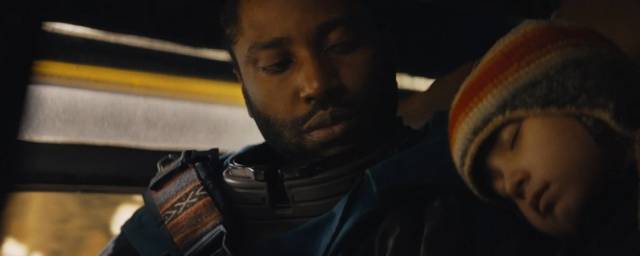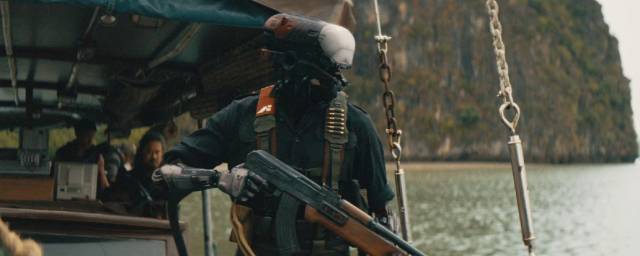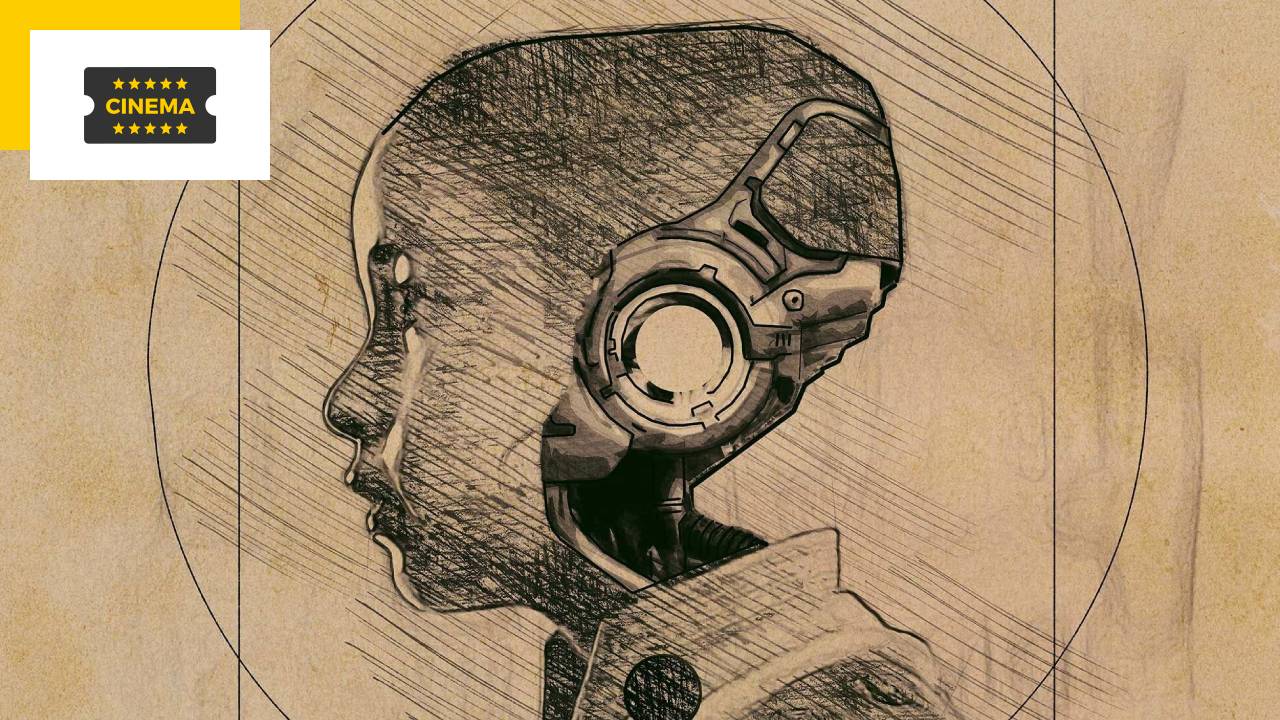A few weeks after “Mission: Impossible 7”, “The Creator” by Gareth Edwards reminds us to what extent artificial intelligence is shaking up Hollywood, which has found in it its new great threat. With nuances.
WARNING – The article below contains some slight spoilers for “The Creator”, as it discusses elements of its plot. So please move on if you haven’t seen it yet.
The complicated relationships between the world of cinema and series and artificial intelligence are not new. HAL 9000 and Ash had key roles in the failed missions of 2001, A Space Odyssey and Alien, respectively. Skynet and the Matrix’s experiments went wrong. And Ultron only took seconds to escape from his creators Tony Stark and Bruce Banner in Avengers 2.
But Blade Runner’s replicants are full of humanity. AI and Chappie have revisited the myth of Pinocchio with a futuristic twist. And it’s very difficult not to melt in front of Wall-E.
The subject has therefore been infused, in different ways, into pop culture for decades. But he has never been more present than in 2023. In front of and behind the camera.
OUCH, ROBOT?
In June, Disney and Marvel caused controversy with the credits of the series Secret Invasion, designed using artificial intelligence. In August, technology was at the heart of a war between intelligence agencies in Netflix’s Agent Stone, as the actors had just joined the writers in their strike. To fight, among other things, against the use of AI which would compromise their work, in the writing of scripts as well as in the use of faces and voices.
And it is in this stormy context, to say the least, that two blockbusters revolving around artificial intelligence are being released: Mission Impossible 7 and The Creator. Films which suggest that AI has become the new big bad of American cinema. If they do indeed reflect global concern, the reality is a little more complex than that.
MISSION IMPOSSIBLE 7: AI, THE ENEMY OF CINEMA?
Tom Cruise likes to tell his stories through his films. And this is even more true in the Mission: Impossible saga, which evokes some key moments in his career. The first episode, in which he takes control of the franchise behind and in front of the camera, echoes his baptism of fire as a producer.
The third film, with Ethan Hunt about to get married, is only the cinematic extension of his romance with Katie Holmes, which he makes at the heart of each media release, even if it means making the springs of the sofa click. Oprah Winfrey.
And each opus since Ghost Protocol, which marked his big comeback after being banned from Hollywood by Paramount following the disappointing figures of the previous film (and its media exits), shows a hero regularly let go by his hierarchy, forced to surpass himself physically with the help of a handful of people he can still trust.
Upset by the Covid pandemic, which split its filming into several parts and pushed back its release date numerous times, Mission: Impossible 7 confronts the hero with a double enemy: a formidable killer from his past, who is not other than the armed arm of the Entity, artificial intelligence capable of anticipating its actions.
“You play a game of four-dimensional chess with an algorithm”, says Luther (Ving Rhames) to Ethan in a dialogue which contains one of the keys to reading the film. Great defender of the theater, designated “savior of Hollywood’s loaves” by Steven Spielberg following the success of Top Gun: Maverick, Tom Cruise is not fighting to save the world so much as the cinema.
Metaphorically speaking, unless the second part of the story reveals that the CEOs of the streaming platforms also created the Entity. But at a time when the filming of 8 was interrupted by the writers’ and actors’ strike, partly due to an AI issue, Tom Cruise is facing an artificial intelligence capable of changing faces and voices, and write her own screenplays herself.
Paramount Pictures France Tom Cruise turns his back on the Entity
That is, in particular, what the remaining strikers are currently fighting against. Visionary story? Yes in the sense that post-production was already well advanced when the movement began. But the latest Mission: Impossible films are films that write and rewrite themselves during filming. And there is no doubt that the context and the repeated pauses had an influence on the big bad of this opus.
Through the face-to-face encounter between Ethan Hunt and the Entity, Dead Reckoning tells the story of the fight between man and machine, and between analog and digital. An opposition which is embodied in particular in Tom Cruise’s desire to perform his own stunts and to limit the use of computer-generated images as much as possible.
By coincidence, Mission: Impossible 7 was released a few weeks after Fast & Furious X, which also offers us a chase through the streets of Rome but with more digital tricks, which shows. And supports the message of Christopher McQuarrie’s film. Even if it comes with some ambivalence, in addition to its score lower than expectations at the box office.
You play a game of four-dimensional chess with an algorithm
Even if he is openly against it, feature films cannot completely do without digital. To transform a jumping ramp into a piece of cliff for example. In the same way that he points out the algorithms but must respect the codes of the saga, even if it means becoming slightly programmatic.
Except when he manages to transcend this pitfall, in Venice, when a dramatic event announced earlier occurs and imbues the story with inevitability. Because it relies on humans, which seems to be the key to the victory of Ethan Hunt who we can hardly imagine not seeing win. Even if it means sacrificing yourself to put an end to your path of the cross by saving the world (and cinema with it?) from this artificial intelligence?
THE CREATOR: AI, THE ENEMY OF MAN?
In the space of three films, Gareth Edwards has shown us his pronounced taste for the apocalypse. Whether caused by creatures (Monsters, Godzilla) or the Intergalactic Empire’s newest weapon of mass destruction (Rogue One). His new feature film, The Creatoris no exception, echoing its Star Wars spin-off.
It is also about an armed conflict (between humans and machines) and the fact that most of the story takes place in Asia is more reminiscent of the first opus by George Lucas, both in its influences and its status as a metaphor. from the Vietnam War, as Rogue One.
Perhaps because the latter had been extensively redone by Tony Gilroy during post-production, leaving Gareth Edwards with a taste of unfinished business as he prepared to put his mark on the saga that made him dream of being small and, indirectly, led him behind a camera. The Creator would therefore be his second attempt at making his Star Wars.
And he hides nothing, to our microphone, of the way in which the legacy of George Lucas has infused into this futuristic story where the Earth was turned upside down when “artificial intelligence designed for our safety dropped a nuclear warhead on Los Angeles”, as the trailer says. A line that shifts the film into the category of those stories where the creature has escaped its creator.
But this is only just beginning, because the rumor of a powerful weapon created by artificial intelligence raises the threat of a victory of the East over the West, in the conflict between them. And forced American soldier Joshua (John David Washington) to return to Asia, where his wife Maya (Gemma Chan) and the child she was carrying were killed during an assault while he was undercover.
Formerly hostile to artificial intelligence (“these are just programs”, he said to his companion who defended them), the hero has somewhat revised his position. And for good reason: he now has a robotic arm and leg. The film then slides towards the writings of Isaac Asimov (and we think of the character played by Will Smith in I, Robot, who was in the same situation), then towards Blade Runner.

20th Century Studios
John David Washington: half man, half robot
Because the weapon in question has the appearance… of a child (played by the astonishing Madeleine Yuna Voyles). A machine which, despite its impressive powers, proves more human than some of the men and women who hunt it down. Already shaken, our certainties are even more so when we are made to understand that the real villain of the story is not AI, but what humanity does with it.
Like an unexpected echo of the current situation in Hollywood, where the screenwriters have just won their case while the actors are still rising up, among other things, against the use that studio bosses could make of this technology. “It’s easy to blame AI, currently, for the problems we sense are coming”Gareth Edwards tells us in an interview on this subject.
“It’s like blaming a computer for what someone writes on the internet. Or a plane for 9/11. There is always someone who misuses this technology. I’m less afraid of AI than of what people could do with it. In the same way that an entire class is punished because of a single unruly student, you can’t hold back these incredible tools that can help people around the world because just one person can do evil with it.”
I’m less afraid of AI than of what people could do with it
“We have to be careful. And there will be problems. But I often think of this image: If I told you, ‘We can have artificial intelligence, but it will kill 40,000 people a year in the United States,’ you would refuse . But cars kill so many people every year in the country, and we keep them because they have a lot of advantages. Nobody wants to give up the car.”
“AI may also have strong benefits, and I don’t know how bad things would have to go for us to want to stop it. But it’s an interesting question, and I don’t know if anyone one knows the answer.” Like him, no one can determine whether artificial intelligence is a friend or an enemy.

20th Century Studios
But Hollywood’s concerns about her are more than ever at the heart of the debates and stories, which make her an adversary or the ultimate weapon of the bad guys. However, and not as obviously as in The Creator, this idea that humans are the key to our future, and that the place of artificial intelligence in our lives depends only on us.
Expected in our theaters on October 25, The Pod Generation will go in this direction by also venturing in the footsteps of Welcome to Gattaca, with its baby story developed in a module, to make pregnancy more equal. And we can’t wait to see how their clashes that Hollywood experienced this year will be reflected on the small and big screen.
Comments by Gareth Edwards collected by Maximilien Pierrette in Paris on September 21, 2023
